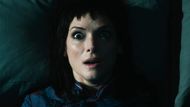Beetlejuice Beetlejuice swang back into Tim Burton’s batty universe, but this time, Lydia Deetz didn’t play the gloomy goth girl in the background; she is front and center. The movie rips open her life, putting her between the land of the living and the loony afterlife, and we watch her juggle family drama and personal demons.
By the time the credits roll, you get a symbolism-heavy finale that’s not just about getting rid of Beetlejuice, but also about Lydia’s journey. Her nightmares are a mirror for her grief and everything she has been trying to figure out about herself. After the ending, you have a ton of questions about what any of it means. Beetlejuice Beetlejuice ending leaves you spinning, debating if Lydia has really grown up, or if she has just found new ghosts to haunt her.
In the original film, Lydia started as a goth teenager interested in death and evolved into a more mature person who could handle complex relationships with the dead and the living. The final scene, as well as the surrealistic nightmare in which Lydia envisions getting married and having a Betelgeuse baby, forms one of the most powerful tools of narration to show her indecisiveness and negativity in terms of acceptance of easy solutions.
Writers Alfred Gough and Miles Millar designed this uncertain ending deliberately to resist neat closure so as to embrace the inner reality of Lydia and her confused identity. In contrast to a traditional story closure, this choice challenges both viewers and industry professionals to consider alternative endings that go beyond meeting everyday moviegoers’ expectations.
Beetlejuice Beetlejuice ending explained: An overview

Beetlejuice Beetlejuice brings back Beetlejuice and focuses on the older and more mature character, Lydia Deetz, and her new problems that are related to family and the ghost world. This film tracks Lydia in her struggle to ensure the safety of those she loves as she also goes through supernatural problems.
Throughout the movie, Lydia is exposed to a variety of ghostly phenomena attributed to Beetlejuice and his irresponsible magic, as well as the worlds of the dead and the living clashing. Lydia, with the assistance of her daughter-like figure, Astrid, and their other characters, tries to prevent Beetlejuice from creating more havoc. That includes preventing the spirit from manipulating other people as well as shaking the balance of the realms.
Lydia becomes stronger and more self-assured in her role as protector and leader, facing her fears and the mayhem that Beetlejuice brings. What follows is an explosive climax that throws her face-to-face with Beetlejuice, leading to a dramatic showdown between Lydia and her demons, both external and internal.
Beetlejuice Beetlejuice ends on an optimistic note at first, where Lydia has thwarted Beetlejuice, and tranquility seems to be back. She and Astrid are ready to make a step into the future, which is a sign of the restoration of the past traumas.
However, the story then turns to a dream sequence, a nightmare that complicates the neat resolution. Lydia imagines a wedding with Beetlejuice and gives birth to a strange baby, the Betelgeuse infant. This dream reflects the unconscious concerns and problems Lydia has. The union with Beetlejuice has significant connotations to the binding power of chaos and the supernatural power that keeps affecting Lydia in her life despite the apparent achievements.
The ending of Beetlejuice Beetlejuice deliberately blurs the lines between reality and fantasy, signalling that Lydia is not yet done with her journeys. The nightmare illustrates Lydia’s unresolved inner conflicts regarding identity, family, and control, as well as the lingering influence of the supernatural world.
Lydia Deetz’s character evolution: From an outsider to a multifaceted protagonist

Lydia Deetz steals the show in Beetlejuice Beetlejuice, as she’s the glue holding everything together. Back in 1988, she was donning a goth vibe, totally not fitting in with her family or, well, anyone. As a teenager, she becomes fascinated with death and drifts away from her family and friends. Her curiosity about dark stuff and emotional sensitivity make her this puzzle of a person. But that’s exactly what makes her the emotional core amidst the film’s ghostly chaos.
In Beetlejuice Beetlejuice, Lydia has grown up, but she still has the same depth of complexity. The sequel deals with the issue of grief and family dysfunction, as she struggles to recover following the loss. The fact that Lydia is discovered to be overprotective of Astrid and her restoring contact with separated relatives indicates a healing process, but the ending reiterates that Lydia is not all cured yet, and the transformation is a long process.
The symbolism of the ending: Themes of family, identity, and the supernatural

The finale of Beetlejuice Beetlejuice contains symbolism that sheds more light on Lydia's world. As a fact, the nightmare sequence, Lydia marrying Beetlejuice and giving birth to the Betelgeuse baby, symbolizes the combination of disorganization and organization, life and death, helplessness and acceptance. It indicates subconscious concerns Lydia has about losing control to the aspects of disarray and anarchy represented by Beetlejuice, who epitomizes chaos in general.
Family emerges as a central motif. The visualisation of Lydia’s future family is grotesque as well as supernatural, yet it is an attempt at her dream about belonging to the world of people and a certain acceptance. This imagery can be interpreted along the lines of inheritance, legacy, and the complicated nature of parent-child relationships, both living and dead.
Students of Gothic literature and film have observed that supernatural tales are used to express anxieties with regard to identity and mortality since these stories employ symbolism to externalize inner conflicts. We can interpret Lydia's dream wedding as a metaphor of the coming-of-age insecurities, the conflict between their own determination and outside expectations. The baby Betelgeuse is seen as an allegory to the blending of Lydia’s worlds, the mundane and the otherworldly, as she is still experiencing a struggle between the two.
Therefore, the symbolism used in the end encourages the audience not to base themselves on the plot but on the deeper significance of the story as it is reflected in Lydia and the Beetlejuice franchise, as a whole.
Impact on Lydia’s future and implications for the Beetlejuice franchise

The ending of Beetlejuice Beetlejuice is up in the air. Lydia’s story isn’t all tied up, and that’s primo for the franchise. They can riff on her journey in any direction now: movies, TV spin-offs, or more.
Everything Lydia has to do with the supernatural is a goldmine. She has layers like identity, family baggage, and an obsession with death. It’s not just about setting up for a sequel; it’s about digging deeper into who Lydia is and what she might become.
Additionally, movies these days are finally catching on: people want complicated characters, not cardboard cutouts, and Lydia is the emotional backbone of this whole circus. Strong female lead that’s more than just a “girlboss” sticker slapped on: she has got grit, she is weird, she is not afraid to get her hands dirty with the dead.
So, bottom line: the ending flips the script for Lydia. It’s not about riding off into the sunset; it’s about the honest-to-god messiness of family, figuring out who you are, and maybe making peace with the stuff that goes bump in the night.
Love movies? Try our Box Office Game and Movie Grid Game to test your film knowledge and have some fun!
